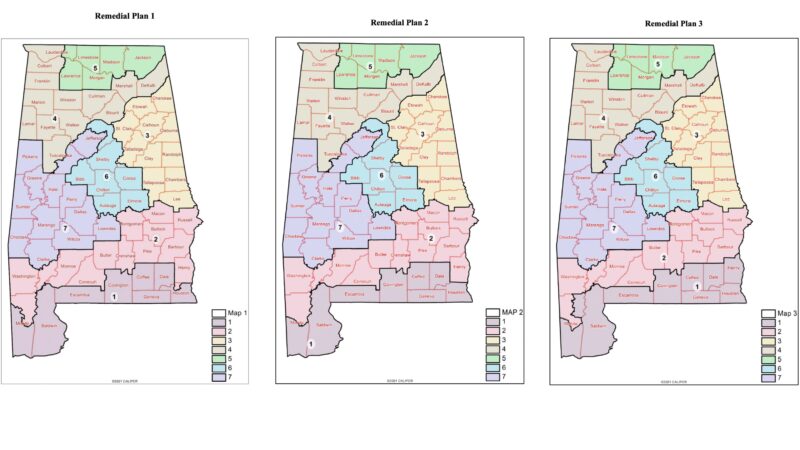Court appointee proposes Alabama congressional districts to provide representation to Black voters
MONTGOMERY, Ala. (AP) — A court-appointed special master on Monday submitted three proposals for new congressional districts in Alabama as federal judges oversee the drawing of new lines to provide greater representation for Black voters.
The three proposals all create a second district where Black voters comprise a majority of the voting age population or close to it — something that state lawmakers refused to do when they drew lines this summer. The court-appointed special master wrote that a performance analysis shows that candidates preferred by Black voters would have won the majority of recent elections in the revamped district.
A three-judge panel is overseeing the drawing of new lines after ruling that Alabama lawmakers ignored their finding that the state should have more than one district with a substantial percentage of Black voters and where candidates preferred by Black voters have a fighting chance to win. Alabama has asked the U.S. Supreme Court to put the redraw on hold as the state appeals, but the justices have yet to rule on the request.
The three-judge panel has tentatively scheduled an Oct. 3 hearing on the special master’s proposed plans.
Kareem Crayton, a redistricting expert at the Brennan Center for Justice at New York University School of Law, which filed an earlier brief supporting plaintiffs who challenged Alabama’s previous map, said the proposals, “show a serious consideration of the need to remedy the violation found by the court.”
“There will be more to review as we get access to the block files supporting these recommended maps, but what’s clear is that the Special Master did what the state had to date simply refused to do: take the directives of the local court seriously. Each proposal appears to create two districts that are either majority Black or close to it,” Crayton said.
The three proposals, submitted by court-appointed special master Richard Allen would alter the boundaries of Congressional District 2 so that Black voters comprise between 48.5% to 50.1% of the voting-age population. By contrast, the district drafted by GOP lawmakers had a Black voting age population of 39.9%, meaning it would continue to elect mostly white Republicans.
However, Allen wrote that the lines were not drawn on the basis of race and did not target a particular Black population percentage in any district. But he said the proposals follow the court’s directive that the state should have an additional district in which Black voters “have an opportunity to elect a representative of their choice.”
“A performance analysis in this case should demonstrate that the Black-preferred candidate often would win an election in the subject district,” Allen wrote. The filing said that candidates preferred by Black voters would have won between 13 and 16 of 17 recent elections.
The three-judge panel had ruled that Alabama’s 2021 plan — that had one majority-Black district out of seven in a state where 27% of residents are Black — likely violated the U.S. Voting Rights Act. The U.S. Supreme Court in June upheld the panel’s finding, leading lawmakers to draw new lines.
The Republican-controlled Alabama Legislature, which has been reluctant to create a Democratic-leaning district, in July adopted a new map that maintained a single Black district. The three-judge panel wrote that they were “deeply troubled” by the state’s defiance, blocked use of the new map and directed a special master to submit proposed new maps.
Pentagon puts Scouts ‘on notice’ over DEI and girl-centered policies
After threatening to sever ties with the organization formerly known as the Boy Scouts, Defense Secretary Hegseth announced a 6-month reprieve
President Trump bans Anthropic from use in government systems
Trump called the AI lab a "RADICAL LEFT, WOKE COMPANY" in a social media post. The Pentagon also ordered all military contractors to stop doing business with Anthropic.
HUD proposes time limits and work requirements for rental aid
The rule would allow housing agencies and landlords to impose such requirements "to encourage self-sufficiency." Critics say most who can work already do, but their wages are low.
Paramount and Warner Bros’ deal is about merging studios, and a whole lot more
The nearly $111 billion marriage would unite Paramount and Warner film studios, streamers and television properties — including CNN — under the control of the wealthy Ellison family.
A new film follows Paul McCartney’s 2nd act after The Beatles’ breakup
While previous documentaries captured the frenzy of Beatlemania, Man on the Run focuses on McCartney in the years between the band's breakup and John Lennon's death.
An aspiring dancer. A wealthy benefactor. And ‘Dreams’ turned to nightmare
A new psychological drama from Mexican filmmaker Michel Franco centers on the torrid affair between a wealthy San Francisco philanthropist and an undocumented immigrant who aspires to be a dancer.







